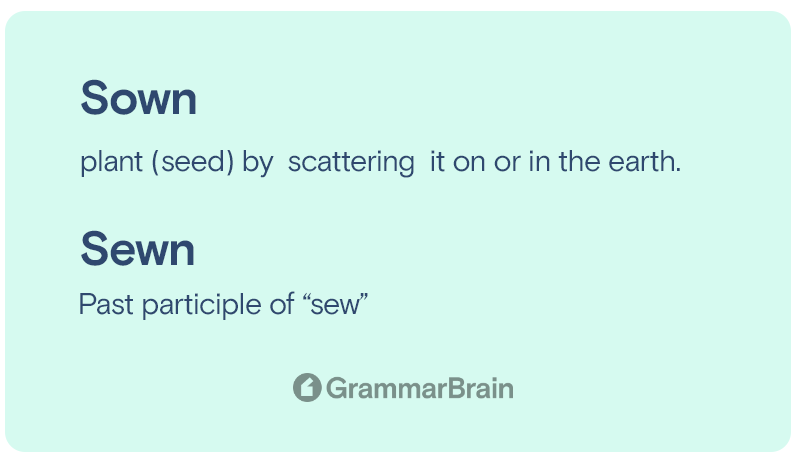Both sewn and sown are verbs. However, their interpretations are different. Sewn and sown are homophones, meaning they sound the same but have different spellings and meanings. In this article, we’ll look at the differences between the words sewn and sown, as well as their meanings and proper usage.
Sewn is a past participle of the verb sews. It refers to the process of sewing material together to make clothes or other items. Whereas sown is the past participle of the verb sow. To sow means to spread seeds on the soil surface for them to grow into a crop that can be harvested later.
| Word | Definition |
| Sown | plant (seed) by scattering it on or in the earth. |
| Sewn (past participle of sew) | join, fasten, or repair (something) by making stitches with a needle and thread or a sewing machine. |
Sewn and sown definition and meaning
Sewn refers to the process of stitching, which is an art that entails stitching multiple pieces of cloth together using needles and threads. When you sew, you use a strand of thread a needle or a sewing machine to stitch fabrics together. Sewing is used not only to create new clothes but also to fix old ones.

You sow something by scattering seeds or planting tiny seedlings in it. The term derives from the ancient British word swan, which means “to scatter seed on the ground.” Sown is the past participle tense of this verb, whereas sowed is the past tense. Sowing is the process of spreading seeds across a field. Sowing is done with the hope of reaping a crop later, which is crucial for farmers.
Difference between sewn and sown
Sewn is a past participle form of the verb sew which means sewing fabrics. So and sown is a past participle form of the verb sow which means the process of planting or sowing seeds in the ground.
The process of sewing involves the use of needles and threads. Sewing is the expression of stitching different pieces of clothes together, for instance, a dressmaker sews pieces of cloth together or a surgeon stitching a deep wound together. Whereas sowing is the process of planting seeds in fields, it is the act of planting seeds to grow a plant.
Proper use of words sewn and sown
Because sew and sow are irregular verbs, their past participle forms are sewn and sown. An irregular verb does not follow the usual pattern of inflexion. The majority of such words have multiple simple past forms. Sew and sow, on the other hand, have regular past forms, sewed and sowed. Only their past participle forms make them irregular.
Other forms of sewing are sewed, sewn, sewing, and sews. Meanwhile, other forms of sow are sowed, sown, sowing, and sows. The word will sew if you’ve heard or seen the terms thread, needles, stitching, clothes, garments, and more. When you notice or see terms like fields, crop and farmer, it means it sows instead of sewing.
Examples of sown and sewn in sentences
Example of sown in sentences:
- Wildflower seeds were sown in the field behind the school.
- Because of the drought, many seeds could not be sown this year.
- Farmers have sown the corn seeds in the fields.
Example of sewn-in sentences:
- This dress was sewn by the best tailors in Arab.
- This shoe appears to be two pieces of leather sloppily sewn together.
- I have sewn the fabric for this dress myself.
Conclusion of Sewn vs Sown
The most simple and basic of the two terms is “sew,” which is always a verb. It also has only one meaning: “stitch with a needle and a thread and “Sow” which is commonly used to refer to “planting seeds.” A female pig is also referred to as a “sow” when used as a noun.
Inside this article
Fact checked:
Content is rigorously reviewed by a team of qualified and experienced fact checkers. Fact checkers review articles for factual accuracy, relevance, and timeliness. Learn more.
Core lessons
Glossary
- Abstract Noun
- Accusative Case
- Anecdote
- Antonym
- Active Sentence
- Adverb
- Adjective
- Allegory
- Alliteration
- Adjective Clause
- Adjective Phrase
- Ampersand
- Anastrophe
- Adverbial Clause
- Appositive Phrase
- Clause
- Compound Adjective
- Complex Sentence
- Compound Words
- Compound Predicate
- Common Noun
- Comparative Adjective
- Comparative and Superlative
- Compound Noun
- Compound Subject
- Compound Sentence
- Copular Verb
- Collective Noun
- Colloquialism
- Conciseness
- Consonance
- Conditional
- Concrete Noun
- Conjunction
- Conjugation
- Conditional Sentence
- Comma Splice
- Correlative Conjunction
- Coordinating Conjunction
- Coordinate Adjective
- Cumulative Adjective
- Dative Case
- Determiner
- Declarative Sentence
- Declarative Statement
- Direct Object Pronoun
- Direct Object
- Diction
- Diphthong
- Dangling Modifier
- Demonstrative Pronoun
- Demonstrative Adjective
- Direct Characterization
- Definite Article
- Doublespeak
- False Dilemma Fallacy
- Future Perfect Progressive
- Future Simple
- Future Perfect Continuous
- Future Perfect
- First Conditional
- Irregular Adjective
- Irregular Verb
- Imperative Sentence
- Indefinite Article
- Intransitive Verb
- Introductory Phrase
- Indefinite Pronoun
- Indirect Characterization
- Interrogative Sentence
- Intensive Pronoun
- Inanimate Object
- Indefinite Tense
- Infinitive Phrase
- Interjection
- Intensifier
- Infinitive
- Indicative Mood
- Participle
- Parallelism
- Prepositional Phrase
- Past Simple Tense
- Past Continuous Tense
- Past Perfect Tense
- Past Progressive Tense
- Present Simple Tense
- Present Perfect Tense
- Personal Pronoun
- Personification
- Persuasive Writing
- Parallel Structure
- Phrasal Verb
- Predicate Adjective
- Predicate Nominative
- Phonetic Language
- Plural Noun
- Punctuation
- Punctuation Marks
- Preposition
- Preposition of Place
- Parts of Speech
- Possessive Adjective
- Possessive Determiner
- Possessive Case
- Possessive Noun
- Proper Adjective
- Proper Noun
- Present Participle
- Prefix
- Predicate



